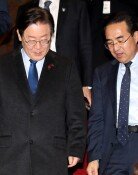N. Korea must follow the suit of Iran to abandon its nuclear programs
N. Korea must follow the suit of Iran to abandon its nuclear programs
Posted July. 15, 2015 07:15,
A foundation has been laid to put an end to Irans threat to build a nuclear weapons, which has shaken the peace of international community over the past 13 years. Iran and six major world powers (five permanent member countries of the U.N. Security Council and Germany) dramatically reached a nuclear deal on Jul. 14 in Vienna, Austria. Under the deal, sanctions would be lifted in return for Irans curbing on a nuclear program. With resolution of the conflict between Iran and the rest of the world which started in 2002 when Irans secrete uranium concentration facility was revealed, the worlds attention is now being drawn to North Korea.
Iran has agreed to extend the time required to produce enough weapons-grade uranium for one nuclear weapon (breakout time) up to 12 months or longer by reducing the uranium concentration facilities. To monitor Irans implementation of the agreement, the International Atomic Energy Agency (IAEA) will carry out inspections on the military facilities in Iran. Economic sanctions will be eased when the IAEA inspection confirms Irans military facilities have nothing to do with development of nuclear weapons. The traditional weapons embargo that Iran demanded to loosen immediately would remain in place for five years.
With the population around 80 million, Iran has a great potential to become an economic giant thanks to the worlds fourth largest oil reserves and second biggest natural gas reserves. Under the economic sanctions over a long period, however, Irans domestic production has decreased and the real unemployment rate has reached 20%. Irans crude oil export volume per day has dropped from 3 million barrels to 1 million barrel. Due to reckless development of nuclear weapons, Iran had to suffer from economic depression and isolation by the international community. Hassan Rohani administration that took office in August of 2013 has made a historic choice to be at the negotiation table in order to avoid the nations crisis caused by pursuit of nuclear programs. The administrations choice has provided a new opportunity for Iran to unshackle itself from economic sanctions, become a functioning member of the international community and recover its sluggish economy.
Although Iran has set a precedent of nuclear program abandonment in exchange for lifting of sanctions, it is hard to expect North Korea to take the same path. The communist regime has already carried out nuclear experiments three times. Right after Kim Jong Un seized power in early 2012, Kim ordered to proclaim the nation as a nuclear power state in the constitution. The North Korean leader also has adopted an equal emphasis policy for nuclear and economic development. The six party talks to find a peaceful solution to North Koreas nuclear program has been suspended since December of 2008.
Reaching the nuclear deal with Iran showed that the two-track strategy with strong sanctions and dialogues is the only way to resolve a complicated nuclear issue. What we need is a comprehensive approach under which South Korea makes efforts to bring North Korea to the nuclear talks and warns about strong sanctions in case of the Norths further provocation including a nuclear experiment. World powers that curbed Irans nuclear program must focus on sanctions and dialogues toward North Korea. The international community must continuously collaborate until North Korea realizes the only way for survival is to abandon nuclear programs and get out of sanctions.







